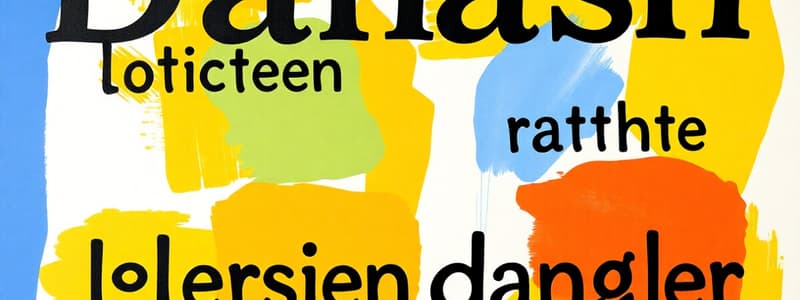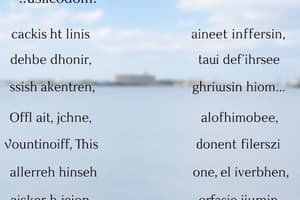Podcast
Questions and Answers
Which phrase means 'Goodbye' in a formal context?
Which phrase means 'Goodbye' in a formal context?
- Det går fint
- Hej hej
- På gensyn (correct)
- Farvel
What is the Danish word for 'Tuesday'?
What is the Danish word for 'Tuesday'?
- Onsdag
- Mandag
- Fredag
- Tirsdag (correct)
Which word means 'thank you' in Danish?
Which word means 'thank you' in Danish?
- Ja
- Hvad
- Tak (correct)
- Undskyld
What does 'Hvordan har du det?' translate to in English?
What does 'Hvordan har du det?' translate to in English?
Which number is represented by 'Fem'?
Which number is represented by 'Fem'?
Which of the following is an incorrect translation for 'black'?
Which of the following is an incorrect translation for 'black'?
The phrase 'Glædeligt at møde dig' means what in English?
The phrase 'Glædeligt at møde dig' means what in English?
What is the proper Danish term for 'vegetables'?
What is the proper Danish term for 'vegetables'?
Which of the following best describes the meaning of 'Min'?
Which of the following best describes the meaning of 'Min'?
Which structure is common in Danish sentences?
Which structure is common in Danish sentences?
Flashcards
God dag
God dag
A polite way to greet someone in Danish, similar to "Good day" in English.
Hej
Hej
A casual greeting form for friends and people you know well. Similar to "Hi" or "Hello".
Hvordan går det?
Hvordan går det?
A way to ask "How are you?" formally in Danish. Similar to "How do you do?" in English.
Hvordan har du det?
Hvordan har du det?
Signup and view all the flashcards
Det går fint
Det går fint
Signup and view all the flashcards
Jeg hedder [Name]
Jeg hedder [Name]
Signup and view all the flashcards
Hvad hedder du?
Hvad hedder du?
Signup and view all the flashcards
Glædeligt at møde dig
Glædeligt at møde dig
Signup and view all the flashcards
Det glæder mig også
Det glæder mig også
Signup and view all the flashcards
Tak
Tak
Signup and view all the flashcards
Study Notes
Greetings and Introductions
- God dag: Good day (formal)
- Hej: Hi, Hello (informal)
- Hvordan går det?: How are you? (formal)
- Hvordan har du det?: How are you? (more formal)
- Det går fint: It's going well.
- Jeg hedder [Name]: My name is [Name]
- Hvad hedder du?: What is your name?
- Glædeligt at møde dig: Nice to meet you.
- Det glæder mig også: I'm glad to meet you too.
Basic Phrases
- Tak: Thank you
- Tak for det: Thank you for that. (slightly more formal)
- På gensyn: Goodbye (formal/neutral)
- Farvel: Goodbye (neutral)
- Hej hej: Bye (informal)
- Undskyld: Excuse me, Sorry
- Jeg forstår ikke: I don't understand
- Kan du tale langsommere?: Can you speak slower?
- Hvad betyder [word]?: What does [word] mean?
Numbers
- 1: En
- 2: To
- 3: Tre
- 4: Fire
- 5: Fem
- 6: Seks
- 7: Syv
- 8: Otte
- 9: Ni
- 10: Ti
- 20: Tyve
- 100: Hundrede
- 1000: Tusind
Days of the Week
- Mandag: Monday
- Tirsdag: Tuesday
- Onsdag: Wednesday
- Torsdag: Thursday
- Fredag: Friday
- Lørdag: Saturday
- Søndag: Sunday
Months
- Januar: January
- Februar: February
- Marts: March
- April: April
- Maj: May
- Juni: June
- Juli: July
- August: August
- September: September
- Oktober: October
- November: November
- December: December
Colors
- Rød: Red
- Grøn: Green
- Blå: Blue
- Gul: Yellow
- Hvid: White
- Sort: Black
- Orange: Orange
- Brun: Brown
- Lila: Purple
Family Members
- Mor: Mother
- Far: Father
- Søn: Son
- Datter: Daughter
- Bror: Brother
- Søster: Sister
- Familie: Family
Food and Drink
- Vand: Water
- Mælk: Milk
- Te: Tea
- Kaffe: Coffee
- Brød: Bread
- Kød: Meat
- Frugt: Fruit
- Grøntsager: Vegetables
- Ost: Cheese
- Æg: Eggs
Common Adjectives
- Stor: Big, Large
- Lille: Small
- God: Good
- Dårlig: Bad
- Ny: New
- Gammel: Old
- Høj: Tall
- Lav: Low
- Lang: Long
- Kort: Short
Basic Question Words
- Hvad: What
- Hvor: Where
- Hvornår: When
- Hvem: Who
- Hvorfor: Why
- Hvordan: How
Commonly Used Verbs
- At være: To be
- At have: To have
- At spise: To eat
- At drikke: To drink
- At tale: To speak
- At gå: To walk
- At købe: To buy
- At se: To see
Demonstrative Pronouns
- Denne: This (singular and feminine)
- Denne her: This (singular and masculine)
- Denne her: This one
- Den: That (singular and masculine/neuter)
- Disse: These (plural)
Possessive Pronouns
- Min: My
- Din: Your
- Hans: His
- Hendes: Her
- Vores: Our
- Jeres: Your (plural)
- Deres: Their
Basic Structure of Sentences
- Subject-Verb-Object order is common in Danish.
- Sentence structure follows a generally straightforward pattern.
Studying That Suits You
Use AI to generate personalized quizzes and flashcards to suit your learning preferences.




